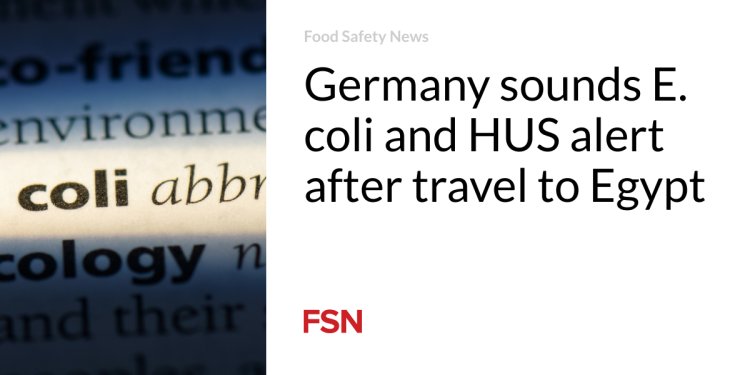Germany Raises E. Coli and HUS Alert Following Visit to Egypt
Increase in E. Coli and HUS Cases Linked to Travelers Returning from Egypt Raises Concern in Germany

German public health officials have issued a warning regarding a surge in E. coli infections among individuals who recently traveled to Egypt. The Robert Koch Institute (RKI) reported an accompanying rise in cases associated with hemolytic uremic syndrome (HUS), a severe complication linked to E. coli infections that leads to kidney failure.
Since the beginning of 2023, there have been a total of 31 E. coli cases and 10 HUS cases reported in individuals who likely contracted the infections during their vacations in Egypt. Notably, a significant number of patients, comprising 12 E. coli cases and six HUS cases, were identified in May and June. Most of them had stayed in various hotels, predominantly in the popular travel destination of Hurghada.
While the number of E. coli and HUS cases in the first half of 2023 is comparable to those reported in 2019, it represents a substantial increase compared to previous years. Among the E. coli cases this year, 13 were women and 18 were men, with a mean age of 3 years and a range spanning from 3 months to 71 years. As for the HUS cases, six were female and four were male, aged between 1 and 30 years. Fortunately, no fatalities have been reported, but at least five E. coli cases and all HUS cases required hospitalization.
Investigations conducted thus far have not revealed any indication of a localized outbreak originating from a single source of infection or a specific hotel. However, they have pointed towards broader concerns regarding food and water hygiene. Hotels in the area typically offer buffet meals and salads, making it challenging for travelers to ensure the consumption of properly cooked items and peeled fruits. Public health officials advise using bottled water in places where tap water is not deemed potable.
The RKI officials anticipate a further increase in cases and urge individuals returning from Egypt with diarrhea to have their stool samples tested for E. coli. Moreover, special attention should be given to symptoms of HUS, particularly in young children.
The RKI has requested clinical laboratories to send isolates or stool swabs from individuals diagnosed with E. coli infections and with a travel history to Egypt to the National Reference Center for Salmonella and Other Bacterial Pathogens. Similarly, isolates or stool samples from HUS cases can be sent to the HUS laboratory at the University Hospital Münster for further analysis.
E. coli infections can mimic other diseases, and specific tests are necessary for accurate diagnosis. Symptoms vary but commonly include severe abdominal cramps, bloody diarrhea, and sometimes fever. While most patients recover within a week, a small percentage develop HUS, a potentially life-threatening condition characterized by kidney failure. HUS symptoms include fever, abdominal pain, fatigue, decreased urination frequency, unexplained bruising or bleeding, and paleness.
While many individuals recover from HUS within a few weeks, some experience permanent damage or even fatalities. Children under five years old, older adults with weakened immune systems, and individuals with compromised immune systems are at higher risk. Immediate medical attention is crucial for those exhibiting HUS symptoms, as the condition can lead to other serious and long-term complications such as hypertension, chronic kidney disease, brain damage, and neurological problems.

 chandni
chandni 



